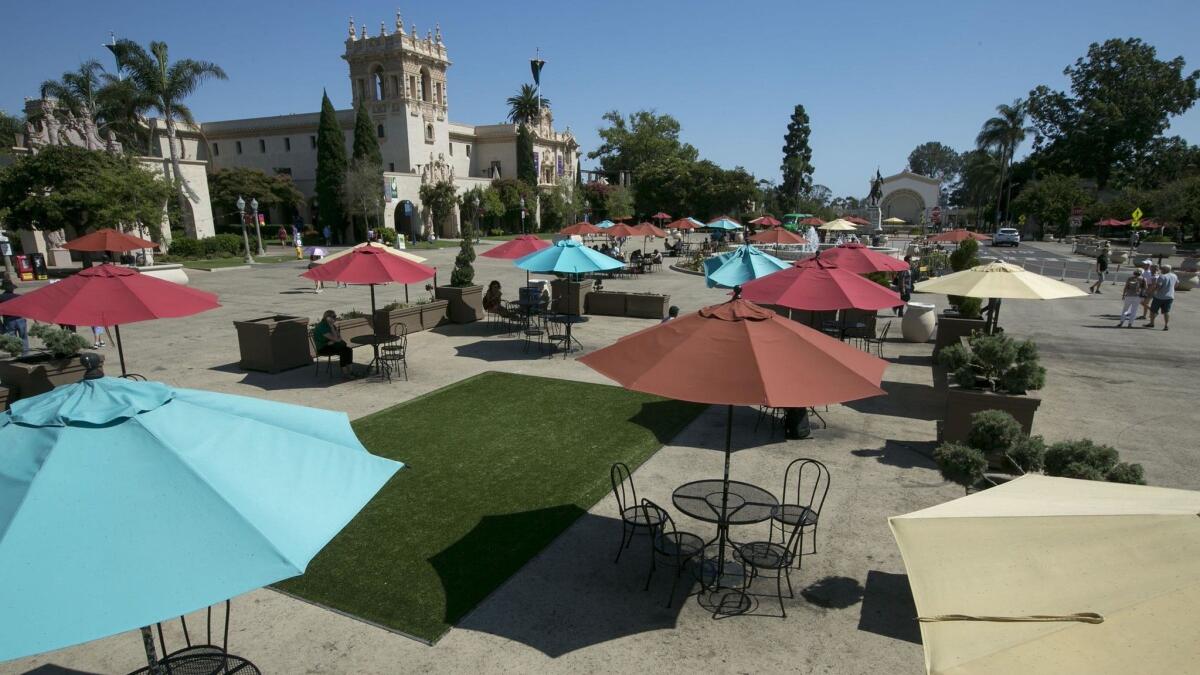City victorious in suit over Balboa Park makeover

The city Monday won a lawsuit that has been holding up the $80 million makeover of Balboa Park’s Plaza de Panama.
In his tentative ruling, San Diego Superior Court Judge Gregory Pollack sided with the city, rejecting plaintiff San Diegans for Open Government’s claims, namely that the bonds the city authorized in late 2016 to sell to cover project costs required a public vote. The judgment, which is expected to be signed and finalized by Pollack in a few weeks, eliminates a legal roadblock for project backers who plan to move forward with construction early next year.
“We’re ecstatic … because this says we can go out there and do our thing,” said Jim Kidrick, who heads the San Diego & Air Space Museum and chairs Balboa Park United, a coalition of various park institutions.
Kidrick expects that the Plaza de Panama project, which represents a partnership between the city and the non-profit Plaza de Panama Committee, to break ground in the first three months of 2019. Construction is anticipated to last between 24 and 26 months.
The pedestrian-friendly park revamp seeks to divert traffic from the Cabrillo Bridge and displace cars from two plazas in the center of the park. The plan, championed by Qualcomm co-founder Irwin Jacobs and backed by Mayor Kevin Faulconer, also calls for a bypass bridge and an 800-space underground garage, topped by landscaping. It was approved by the City Council in 2012.
Activist attorney Cory Briggs, on behalf of San Diegans for Open Government, challenged the legality of bonds proposed to cover about $50 million of the project; the remaining $30 million is being raised privately. Briggs also found fault with the city’s agreement to give the committee, established by Jacobs, the naming rights for several park facilities.
“My clients have a really good case (for appeal),” Briggs said. “The bonds are illegal. They need a public vote; they incurred too much money. (The city) doesn’t have the money to pay for (the bonds); they didn’t get the certification that the funds were available.”
Some of Briggs’ arguments, however, weren’t considered by Judge Pollack, who Monday also granted the city’s motion to dismiss its own cross-complaint. Briggs characterized the city’s actions as “deceptive maneuvering” because the cross-complaint, he said, introduced several legal problems around the city’s bond approval process that ultimately couldn’t be factored into the judge’s ruling.
Faulconer lauded Pollack’s ruling as a triumph for parkgoers.
“Today’s court victory shows what can happen when we continue to push bold ideas and don’t let a small group of naysayers stand in the way of progress,” he said in a statement. “This project will mark the largest investment in Balboa Park in decades and transform the plaza to its original grandeur with acres of new park space for San Diegans to enjoy.”
The city will work jointly with the Plaza de Panama Committee to design the project, and will take the lead on construction, according to the city attorney’s office, which tried the case. Contractors will be selected through a competitive bidding process.
Dating back to 2009, the Balboa Park makeover has been in limbo for years. A separate suit from preservationist group Save Our Heritage Organisation also sought to kill the project. The organization lost its case and is appealing the ruling.
Business
jennifer.vangrove@sduniontribune.com (619) 293-1840 Twitter: @jbruin
Get U-T Business in your inbox on Mondays
Get ready for your week with the week’s top business stories from San Diego and California, in your inbox Monday mornings.
You may occasionally receive promotional content from the San Diego Union-Tribune.
